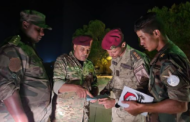In Benghazi, in a televised address on September 18, Khalifa Haftar announced that he was now permitting the resumption of Libya’s oil production and exports. The following day, Libya’s National Oil Corporation (NOC) announced the lifting of the status of force majeure imposed on several oil fields and ports.
In Sirte-Jufra, the local Operations Room has intensified patrols after detecting suspected movements in the area.
At the international level, the deputy spokesman for the UN Secretary General Farhan Haq has confirmed on September 18 that the UN and Germany are preparing for a Berlin II Conference.
The Acting UN envoy to Libya, Stephanie Williams, met on September 14 with Eunavfor Med “IRINI Operation” commander, admiral Agostini and welcomed recent efforts at enforcing the arms embargo in Libya.
On September 14, Turkey’s Defense Minister Hulusi Akar received the commander of Libya’s Naval Forces in the capital Ankara, according to a statement by the Turkish Defense Ministry.
BENGHAZI
- activists in Benghazi renewed on September 18 their calls for demonstrations on September 21 against corruption and those responsible for it. They also called for early elections and the removal of all existing bodies from their positions, in addition to the assets freezing of those accused of corruption and banning them from travel until they have been investigated and held accountable;
- in a televised address on September 18, Khalifa Haftar announced that he was now permitting the resumption of Libya’s oil production and exports “on condition that it is not used to finance terrorism.” Haftar had previously pretended that it was the local tribes that had blockaded Libya’s oil production and exports.
SIRTE
- Sirte-Jufra Operations Room forces have intensified on September 17 patrols on Al-Nahr in south Sirte and in Bunajim and south of Al-Wishka, after detecting dubious movements in the area, saying the security procedures are aimed to prevail stability and detain “Haftar’s militia fighters”. The OR spokesman added that three vehicles carrying Russian mercenaries was heading to Sirte and Jufra at a time the Libyan dialogue was ongoing in Egypt, Morocco and Switzerland.
TRIPOLI
- the Head of the High Council of State Khalid al-Mishri rejected on September 20 the deal made by the member of the Presidential Council Ahmed Maetig and Khalifa Haftar’s son Khalid to resume oil production and exports, saying in a letter to the Presidential Council Head and members – two days after the deal was announced – that the deal violated Libyan Political Agreement laws;
- Libya’s National Oil Corporation (NOC) announced on September 19 the lifting of the status of force majeure for what it called safe oil fields and ports. It did not name the potential oilfields and ports. The NOC stressed the importance of adhering to professional and non-political principles in any arrangements related to the lifting of force majeure from oil fields and ports;
- the National Oil Corporation (NOC) on September 18 refused to resume oil production and exports saying that the lifting of force majeure is linked to a conditional link to transparency coupled with new security arrangements by the NOC;
- Ahmed Maetig, Deputy head of Libya’s Presidency Council, which is headed by Fayez al-Sarraj, published on an official Libyan government Facebook page the terms of the agreement with Khalifa Haftar for the resumption of oil exports on September 18;
- Libya’s internationally recognized Prime Minister, Fayez al-Sarraj, announced his ‘‘sincere desire to hand over his duties to a new authority (government) no later than next October”. The announcement came in a televised, pre-recorded statement on September 16;
- the Libyan Interior Minister Fathi Bashaga issued a decision on September 15 aimed to start containing armed groups and fighters at the Ministry and dismantling others. The decision split the targeted fighters into three categories: Red, Yellow and Green; the Red to be dismantled and the other two to be merged in the Interior Ministry apparatuses.
INTERNATIONAL RELATIONS
- the Head of the Presidential Council Fayez al-Sarraj and German ambassador to Libya Oliver Owcza met in Tripoli on September 20 and reiterated importance of committing to Berlin conference conclusions on Libya. The two officials talked about the latest developments in Libya and joint cooperation between the two countries, especially German companies’ participation in reconstruction projects;
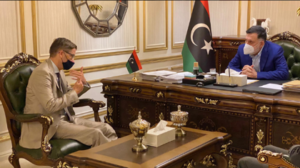
- the Italian Ministry of Foreign Affairs said that with its full respect to Libyan sovereignty and with the full support of the Libyan people, its greatest hope is that all parties will responsibly support the path to dialogue towards an agreed solution to the Libyan crisis, within the framework of the Berlin Conference;
- the Secretary-General of the United Nations, Antonio Guterres, expressed his concern regarding reports that there are coordinated operations to repel migrant boats, using special ships to return refugees and migrants to Libya. Guterres said in his report, on September 20, that Libya is not considered a safe landing place for migrants or refugees and that UN member states are obliged to ensure their transfer to a safe and secure place;
- the United States’ embassy in Libya has rejected some Libyan personalities’ pursuit of personal gains at the expense of Libyan people’s greater good. The US embassy said on Twitter on September 18: “We strongly support UNSMIL’s message and recognize Fayez al-Sarraj’s political courage in signaling a willingness to set aside personal interests for the benefit of the Libyan people”;
- the deputy spokesman for the UN Secretary General Farhan Haq has confirmed on September 18 that the UN and Germany are preparing for a Berlin II Conference to pick up from where the first conference of January 2020 has left. Haq told the German news agency that the Berlin II Conference will be held on October 05 and it will be a virtual meeting (video conference);
- UNSMIL reported on September 18 it had convened virtually the third meeting of the Libyan Economic Dialogue. The meeting was chaired by Acting SRSG Stephanie Williams and brought together 29 Libyan economic experts along with representatives from UNDP and the World Bank, to discuss the progress in the economic track and review the policy road map developed as part of the Berlin process;
- the Turkish President, Recep Tayyip Erdogan, said on September 19 that Khalifa Haftar feels defeated and is attempting to exploit civilians, stressing that Haftar will taste total defeat sooner or later. Commenting on Al-Sarraj’s intention to resign at the end of next October, Erdogan expressed his personal regret;
- Stephanie Williams, the Acting head of UNSMIL, commended on September 17 what she called the ‘‘courageous’’ decision by internationally recognized Libya Prime Minister Fayez al-Sarraj to announce his intention to hand over power to a new executive authority by the end of October;
- Turkey and Russia have inched closer to a deal on a ceasefire and political process in Libya during their latest meetings in Ankara, Turkish Foreign Minister Mevlut Cavusoglu said in an interview with broadcaster CNN Turk late on September 16. Both sides held this week a new round of talks on developments in Syria and Libya, which was expected to end on September 16;
- UNSMIL welcomed on September 16 the coming together of Libyan health professionals across the country to combat the spread of the Coronavirus. UNSMIL reported that the group of Libyan healthcare professionals from across the country met in Tripoli, Benghazi and Sebha to participate via a video teleconference in the first of a series of UN-supported technical exchanges to combat COVID-19;
- on September 15, five members of the UN Security Council (Belgium, Estonia, France, Germany and Ireland) welcomed the inter-Libyan dialogue held in Bouznika and its outcome, considering it a “positive step” towards the rapid resumption of the political process and a way out of the crisis in Libya;
- the Italian Foreign Ministry has rejected extortion over the Italian nationals detained in Libya’s Benghazi. The Italian Foreign Minister Luigi Di Maio said on the radio on September 15 that a government summit would be held to discuss this blackmail regarding the detained Italian fishermen in Benghazi, which Rome wouldn’t accept, adding Italy had contacted international actors who have influence on Haftar to help release the fishermen;
- the Chargé d’Affairs at the Hungarian Embassy in Libya expressed his country’s readiness to provide its expertise and technology to the security services of the Ministry of Interior and to contribute to the development of the ministry. In his meeting with the Minister of Interior, Fathi Bashaga, in Tripoli on September 15, the Hungarian diplomat affirmed that his country is ready to provide training programs for the ministry’s employees, according to their specialties;
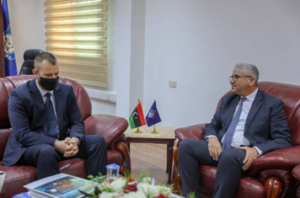
- the Security Council extended on September 15 the mandate of the UN Support Mission in Libya one more year as Russia abstained from voting on the resolution. The spokesman for the UN Secretary General said the leadership of the UNSMIL will see the appointment of a new head to replace Ghassan Salame who resigned last March. The Secretary General Antonio Guterres appointed Stephanie Williams as an acting head of UNSMIL till a new head is selected;
- the Turkish Foreign Minister Mevlut Cavusoglu said that France’s coordination with the Government of National Accord (GNA), created no conflict with Turkey, adding in an interview with one of the private Turkish Channels on September 15, that Ankara considers the meeting between French officials and the Head of the Presidential Council (PC), Fayez al-Sarraj, a step in the right directio;
- the Deputy Chairman of the Presidential Council (PC), Ahmed Maiteeq, met with the Turkish Defense Minister, Hulusi Akar, along with the Foreign Minister Mevlut Cavusoglu, during his visit to Ankara. According to a statement released by the PC on September 15, Maiteeq discussed with Akar the possibility of enhancing prospects for joint coordination between both allied countries, in order to achieve security and stability in Libya;
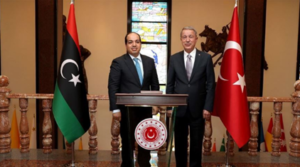
- the Libyan Foreign Minister, Mohamed Sayala, has discussed with his Tunisian counterpart, Othman Jerandi, the latest developments in the present Libyan situation, following the Bouznika, Montreux and Cairo discussions. Jerandi stressed Tunisia’s support for a political solution in Libya, reiterating that there is no place for a military solution;
- the Acting UN envoy to Libya, Stephanie Williams, met on September 14 with Eunavfor Med “IRINI Operation” commander, admiral Agostini and welcomed recent efforts at enforcing the arms embargo in Libya after intercepting a UAE vessel bringing military support for Khalifa Haftar in Libya in violation of the UN arms embargo;
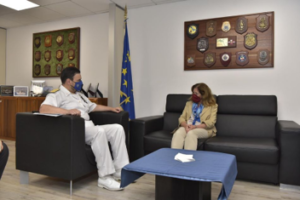
- Turkey’s Defense Minister Hulusi Akar received on September 14 the commander of Libya’s Naval Forces in the capital Ankara, according to a statement by the Turkish Defense Ministry. The statement said that in his meeting with Chief of Naval Staff Abdul Hakim Abu Huliya, Hulusi Akar said Turkey stood by Libya’s legitimate government.
- the Turkish Defence Minister, Hulusi Akar confirmed his country’s support for all Libyans to achieve unity in their country and assist them in establishing Libya’s regular army to preserve Libyan security and sovereignty.




